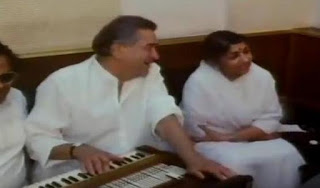Today, Dec 14, is the 98th birth anniversary of a man who is considered the doyen of filmmaking in India.
Yes, I'm speaking of none other than Raj Kapoor.

So without further ado, here is my humble tribute to the man known as the Greatest Showman of Indian Cinema.

I know RK enjoys more of a reputation as a filmmaker than an actor, but for me, I've enjoyed his early days as an actor more than I've enjoyed any of his films as a filmmaker, and that includes the films he acted in, directed and produced.
I remember when I was a little kid there was a RK retrospective playing in the local suburban theatre near where I lived, a rickety, moth-infested place but with really cheap tickets. So we went because watching movies in a theater was still a luxury and a rare treat then, no matter the quality of the film.
We watched Shree 420, Awara and Boot Polish on 3 different days (the festival ran for a week), and I was fascinated, especially by Shree 420, not so much by Awara and Boot Polish. Now, I have greater appreciation for Awara but as a kid, the lovable, well-meaning, honest tramp of Shree 420 who gets swayed by the glamour and opulence of the upper class when he's down and out on his luck was very appealing.
For a long time, in my childhood memories and well into adolescence, RK remained the epitome of that tramp for me, and to be very honest, I began to grow tired of that image reinforced (in my immature mind) by movies like Anari, Teesri Kasam, Jis desh mein Ganga behti hai and Jaagte Raho.
I thought this was all RK was capable of being. The Chaplinesque vagabond/ naïve village bumpkin/ innocent and honest small towner role kept repeating all too often and it stuck. I would argue that he was repetitive and my dad would argue back saying I didn't know what I was talking about. To his mind, the fact that he portrayed that lovable tramp image so well was his selling point and to me, it was the opposite.
Years later, when I was in college and very into Retro Hollywood movies, I watched Frank Capra's 'It happened one night' and loved the movie and Clark Gable so much in it that I went about looking for similar ones. When I found out there was a Hindi version with Raj Kapoor and Nargis I was sorely disappointed. Yes, disappointed, because I thought, very foolishly, how in the heck could Raj Kapoor match the suave charm and dashing presence of Gable which was the prerequisite for the character? Why oh why did they not make this movie with Dev Anand? (Sidenote: they did 😀)
But I had heard the songs and watched them and loved them and also liked the way RK emoted in Ye raat bheegi bheegi and Aaja Sanam. Then one day the movie just fell into my hands and having nothing better to do, I decided to sit down and watch Chori Chori. I swear I must have a type, because just like DK in Aan, RK as Sagar in Chori Chori stole my heart. He was everything Gable was and in some instances he was better because he was Indian and therefore, more relatable. He had the polish and cheekiness that the character warranted, but also brought a vulnerability and honesty that floored me.
Chori Chori is still among my favorite RK movies and Sagar and Kammo are among my favorite on-screen pairings ever! To think it was the last time he and Nargis paired together romantically! 
I liked them even more than Dev and Waheeda in Solwa Saal - the other IHON remake - which is surprising because these two are my absolute favorites. But I have to say in all honesty Chori Chori is superior in every way. Apparently, RK was called "the Clark Gable of the Indian film industry" (have to find a source/ citation for this) very likely because of this film.
That movie changed my opinion of his on-screen persona. I became convinced that he wasn't always the bumbling, lovable, innocent bumpkin. He could also be a suave, sophisticated, charming, modern man of the world.
I think to this date RK suffers from media peddling of that bumbling persona. Or perhaps he himself peddled it, and perhaps in those times that was seen as a shrewd marketing gimmick. It did make his movies popular overseas! But when I rewatched Awara after many years, I became aware of how mistaken I was in supposing that he always played the same kind of characters.
The Raj in Awara had nothing in common with the Raj in Shree420 except for the ankle length pants. Or even Rajkumar in Anari or Hiraman in Teesri Kasam. Or the poor, unemployed, unnamed youth in Jaagte Raho who wanders the streets of a heartless big city in search of a drink of water and instead is exposed to the dark and putrid underbelly of corruption and chaos. Who barely speaks a word with his mouth but says volumes with his eyes. I think Jaagte Raho is among his best, if not his best performance as an actor.
Each time I watch the song Jaago Mohan Pyare and the scene where Daisy Irani wipes his tears and sends him on his way saying, "Darte ho? Kyon? Tumne toh kuch bhi nahi kiya!" I sob like a baby because courage and conviction in the face of innocence is such a powerful thing. 
That was the beauty of RK's movies. They always had social and moral undertones and there was always a takeaway for the audience - a point to ponder, a slice of real life to dissect, or a lesson to learn. Even in the case of movies he did not direct such as Jaagte Raho, Anari, Teesri Kasam and Phir subah hogi. I think he consciously chose such movies because he understood the bigger picture: that movie making was more than just providing mere time-pass entertainment. He had a social and moral responsibility to the public that paid to see his movies and that thought reflected in his choices.
There is a story that is told of how Shailendra approached him for Teesri Kasam and once the narration was done, RK stayed silent for a long time and then in a solemn tone asked for his advance. Shailendra was supposedly blindsided because he had hoped as a friend and well-wisher, the talk of advance wouldn't come so soon, since he did not have the budget to pay RK's then commanding price. But then seeing his friend's crestfallen face, RK laughed aloud and asked for one rupee. And that remained his final payment for Teesri Kasam. What a wonderful, thought-provoking movie and how sad that it did not work at the BO!  Years later, it won accolades but it was too late by then for Shailendra to enjoy them. This happened with so many filmmakers - projects that they invested their heart and soul into did not work and that plunged them into the depths of despondency. Vyjayanthimala with Amrapali, Guru Dutt with Kaagaz ke phool and RK himself with Mera naam Joker.
Years later, it won accolades but it was too late by then for Shailendra to enjoy them. This happened with so many filmmakers - projects that they invested their heart and soul into did not work and that plunged them into the depths of despondency. Vyjayanthimala with Amrapali, Guru Dutt with Kaagaz ke phool and RK himself with Mera naam Joker.
RK, however, could recover from the failure of MNJ and went on to make many commercially successful films: Bobby, Satyam Shivam Sundaram, Prem Rog, Ram teri Ganga maili etc.
His filmmaking prowess cannot be under-estimated even if he had a head start thanks to his father, Prithviraj Kapoor the founder of Prithvi theater. Born Shrishti Nath Kapoor ( aka Ranbir Raj Kapoor) in Peshawar in 1924, his family moved to Bombay where he began apprenticing very early on and also appeared in a small role in the movie Inquilaab (1935). It was only when he began assisting Kidar Sharma that he was offered a lead role opposite Madhubala in Neelkamal (1947).
But his focus was always filmmaking, never acting. He was courageous enough to branch out on his own, and set up RK studios and made his first film under the banner, Aag, at the tender age of 24! Watching Aag it's hard to believe that kind of maturity and complexity of thoughts and ideas could come from someone so young.
Not to mention the innovations he brought about and his novel way of depicting allegory and symbolism - like the Tere bina aag ye chandni/ Ghar aaya mere pardesi dream sequence famous for its imagery, the heavenly staircase and the dark depths of hell showing how much Raj is torn between choosing an honest life and Rita - the love of his life or the life of crime he was sucked into by the villainous KN Singh. Or the symbolism in the songs Mud mud ke na dekh and O janewale mud ke zara dekh ke jaana demonstrating how he's torn between Maya (Nadira/illusion) and Vidya (Nargis/ truth or knowledge).
Not only was he a great showman and knew just what it took to hook the audiences, but he also knew music and played several instruments himself. No wonder then that RK's songs were among the best from the era and are still hummed and remembered to this day. Lata Mangeshkar has spoken of how involved he'd be in every aspect of his movie scores. Once he fired Ram Ganguly (MD of his first film, Aag) and set up a partnership with Shankar-Jaikishen and Shailendra he had one of the most formidable musical teams ever. Starting with Barsaat, SJ were the staple MDs for all RK productions.
The story goes how RK insisted on having them for Phir Subah Hogi, a film based on Fyodor Dosteovsky's Crime and Punishment and the lyricist, Sahir Ludhianvi put his foot down and said only someone who had read the book and understood the story and the characters could do justice to the music. RK grudgingly agreed to having Khayyam on board with the caveat that he would vet each song that was composed. But he had no complaints because Khayyam came up with an impeccable score with songs such as Cheen-o-Arab hamara, Aasmaan pe hai khuda, Phir na keeje meri gustakh nigahi ka gila, Jis pyar mein ye haal hai and of course the poignant, tear jerking title track.
With Anari, he gave Hrishikesh Mukherjee a break, after being impressed with his work in Musafir. Anari went on to win him the Filmfare for Best Actor and also won Best Music, Best Lyrics and Best Playback singer for SJ, Shailendra and Mukesh respectively.
He has been awarded the Padma Bhushan and the Dadasaheb Phalke Award, and also has 11 Filmfare awards for acting and directing under his belt.
He died young in 1988 at the age of 63, probably because the heavens were bored and they needed the Greatest Showman to entertain them!
Happy Birthday, RK!⭐️
Please do post about your favorite RK songs/ stories/ trivia/ roles to celebrate this amazing artiste and entertainer!


































64